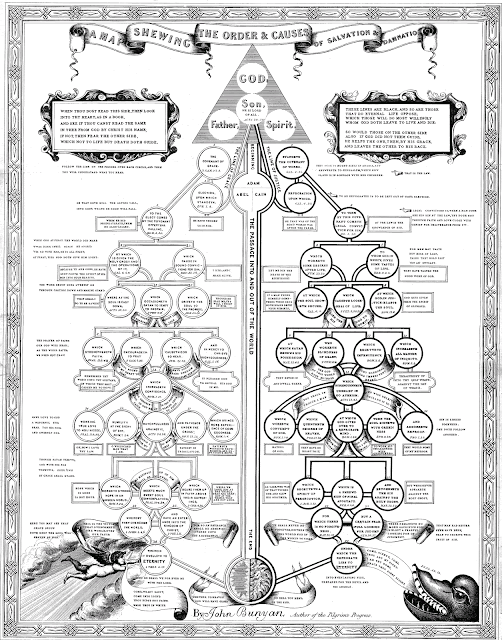The ordo salutis (order of salvation) is supposed to tell us about the logical order of God’s decree to save some people and not other people. There are differing versions of the order and this fact has led to some of the deepest divisions in the church. Some think God determined whom to save before he decreed the means for their salvation. Others think that God’s decree to save some people came after his decree to permit them to sin. The important feature of the order is that it is not supposed to be a temporal order. Supposedly, God logically orders his decrees without temporally ordering them.
The trouble is I can’t quite put my mental finger on what a logical order might be. Every time I try, I use words like ‘then’ and ‘before’, and ‘after’. But these are distinctly temporal in nature. Of course, when you and I consider logical implications we consider them in order. But we consider them in temporal order. We move from premises to a conclusion one at a time because we are not omniscient and not omnipotent. God, on the other hand, can consider all implications all at once. But if God so does, what kind of order are we talking about. If it’s not temporal, then what?
George Mavrodes suggested that God has inferential knowledge. However, unlike us mortals, God does not come to some conclusion on the basis of some set of premises since God already knows the conclusion. However, it is possible to think of propositions being logically dependent upon one another without coming to know a proposition. If so, then perhaps the order is hierarchical in nature – one proposition is logically dependent on the truth-value of another proposition.
The problem is that there is no such logical entailment in the order of decrees. Decrees to permit to sin, save, damn and alike don’t appear to logically entail one another. Indeed, salvation as a free gift of grace could not be entailed by anything otherwise it would not be grace. I suppose we could say that God’s decree to create is logically entailed by his decree to elect some people to salvation. But this is minimal fruit.
My suggestion (and I am not alone in this) is that we should ditch the idea of logical order and we should ditch it because it is unintelligible. For a some term to be unintelligible is for it to be undefinable. In order to define logical order we would have to be able to define it in terms that make use of no temporal terms. But try as I might, I cannae do it.
Instead, as John Feinberg argues, we should think of God choosing one of infinite possible worlds all of which are complete. Due to his omniscience, God knows the content of each possible world and chooses one. He does not have to put a world together piece by piece. As Feinberg says:
There simply is no logical sequence of choices to construct when what God chooses is a whole world, not individual events, actions etc. Hence, it is is wrong to ask whether God decreed first (logically) to create human beings, to save the elect, or whatever (Feinberg, No One Like Him, 536).


